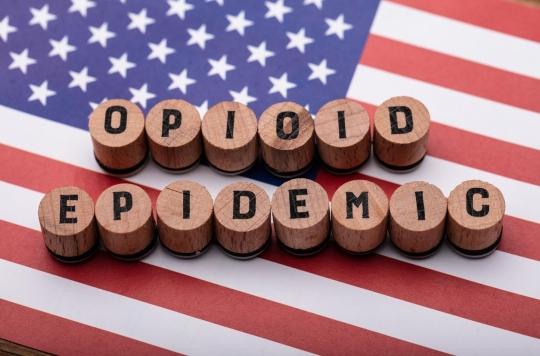American justice recognized Monday, August 26 the responsibility of the Janssen laboratory, pharmaceutical division of Johnson & Johnson, in the opioid crisis which is ravaging the United States. She ordered him to pay 572 million dollars, or about 500 million euros, to the State of Oklahoma.

President Donald Trump has called the situation a “public national emergency”. For twenty years, the United States is ravaged by the opioid crisis : 130 people die of an overdose every day. After two months of trial, justice recognized Monday, August 26 the responsibility of the Janssen laboratory, pharmaceutical division of Johnson & Johnson, in this crisis. She ordered him to pay 572 million dollars, or about 500 million euros, to the State of Oklahoma. This is the first civil judgment in this case.
According to the judge, the laboratory has led to addiction to painkillers, overdose deaths and an increase in neonatal abstinence syndromes in Oklahoma.
In detail, the laboratory, which designs and distributes the Nucynta tablets and the Duragesic patch, which contains fentanyl, one of the most powerful synthetic opiates, is accused of having created the demand. For this, he would have resorted to a large campaign “deceptive marketing and promotion of opiates” to doctors through research funding and “education” and training events.
“Pseudo-addiction”
The band “used the term pseudo-addiction to persuade doctors that patients who showed signs of addiction, for example by asking for increasingly higher doses of opiates or returning to the doctor before the theoretical exhaustion of the previous prescription, were not really suffering of addiction, but in fact of under-treatment of pain”, explained the judge. And to conclude: “The opiate crisis has ravaged the State of Oklahoma. It must be contained immediately.”
The fine will therefore be used to fund programs in Oklahoma to try to overcome the crisis. If it may seem significant, it is low compared to the 17 billion dollars (about 14 billion euros) claimed by this State.
Several laboratories preferred an amicable agreement
When the court decision was announced, the group immediately announced that it would appeal. “Janssen did not cause the opiate crisis in Oklahoma,” said Michael Ullmann, vice president and chief legal officer of Johnson & Johnson.
If it is not the only group to have been sued, several laboratories have preferred an amicable agreement, for a fee. Among them, the Purdue Pharma group, seller of OxyContin, which settled 270 million dollars before the trial. The Israeli Teva meanwhile negotiated an agreement to 85 million.
In all, nearly 2,000 other complaints have been filed against manufacturers of opiate drugs by various US courts.
47,000 overdose deaths in the United States in 2017
In total, since the early 2000s, 300,000 people have died from overdoses in the United States. In 2017, 47,000 such deaths were recorded in the country. For many of these victims, the addiction stemmed from an over-prescription of painkillers. The Canadian neighbor is also largely affected by this opioid crisis. Between January 2016 and March 2018, around 8,000 people died from this problem.
As for France, if the figures are less important, the phenomenon is no less worrying. Since the 1990s, prescriptions for opioid analgesics (tramadole, codeine, etc.) have exploded to concern 10 million people in 2015. In 2017, they represented 22% of all painkillers consumed to manage cancer pain. but also to relieve the chronic pain suffered by 10 to 12 million French people. As for strong opioids (oxycodone, morphine, fentanyl), their prescription has increased by 150% in ten years.
But whether they are “strong” or “weak”, opiate-based drugs carry serious risks of addiction and overdose. In 15 years, the number of hospitalizations for addiction has therefore increased by 167%. As for the number of deaths by overdose because of these drugs, it is also growing rapidly. “These are a few hundred deaths per year, at least 200, perhaps between 500 and a thousand. But it’s probably already too much”, explained Nicolas Luthier, director of the French Observatory of Analgesic Medicines (OFMA), to Release in an article on the subject.

.















